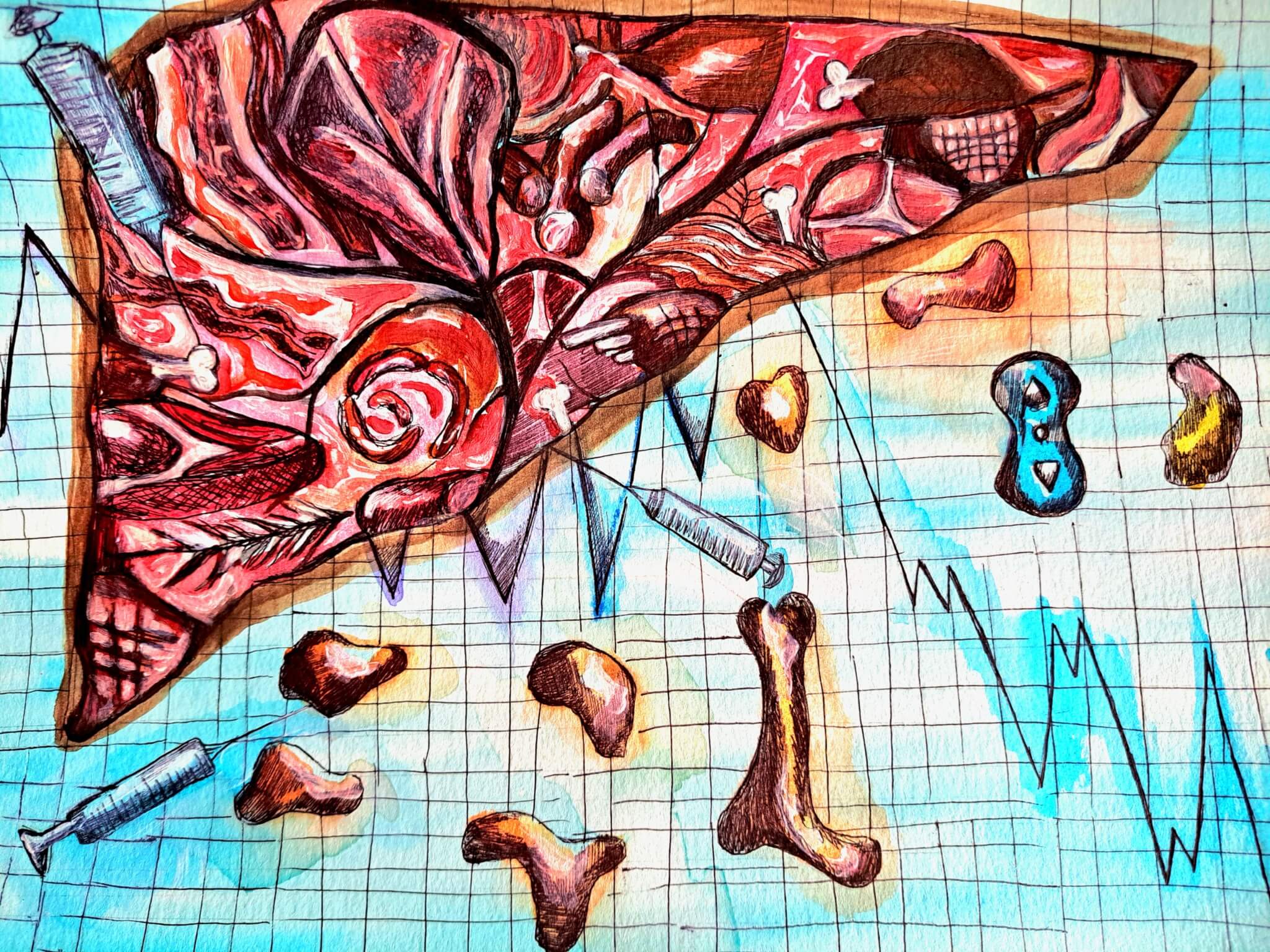Arthropods are important to the earth's ecosystems
Vegan Society of Canada News
Published April 6th 2021
Updated June 26th 2022
If animals were represented using a proportional voting system, we would be spending a vast majority of our time discussing the exploitation of arthropods. The diagram below derives from the latest research on the biomass distribution on earth; it shows the estimated distribution of animals in gigatonnes of carbon (GtC)

It should be immediately clear that arthropods, which includes insects, is by far the largest group of animals on earth. This is only an estimate using biomass as a reference, but it is obvious that arthropods’ weight is much less than the average member of the chordates to which human animals belong. This makes the estimation of the number of living animals even more skewed in the direction of arthropods. To translate this into more meaningful numbers, it is estimated that at any time there are 10 quintillion (10,000,000,000,000,000,000) individual insects alive or about 200 million insects alive for each human animal.
There is a serious problem currently in veganism: As currently practiced, veganism may not be concordant with reaching our vision. We speculate there are many reasons for this, but we posit one of them being our collective disproportionate focus on animals used for food.
Our disproportionate attention to the small number of animals used for food is at the detriment of the countless other issues that create the conditions for the exploitation of all other animals. To put things in perspective further, we all know the terrible consequences of human caused climate change. In the last few decades we experienced a drastic increase in wildfires, most of them linked to human-animal caused climate change.
Doing some rough statistical analysis combined with gross assumptions, if we assume that all wildfire are due to climate change, and we assume that all arthropods die during a wildfire, in one wildfire season in the USA alone wildfires kill the number of arthropods that would be equivalent to 15,909 years of all land and sea animals that are killed for food globally. This is a rough estimate, and we know that not all wildfires are due to climate change and we know that not 100% of arthropods die; but even making some generous assumptions and cutting this number in half, we always end up with an enormous amount of animals killed by human animals.
This disproportionate focus on animals used for food also causes various other issues. One of them of course being that it possibly makes our vision unreachable. Another is it continues to propagate the fallacy that veganism is only a diet, or that diet is the most important thing in veganism, or that plants are inherently better. We also posit that it is in part the cause for results observed in this research in 2019 where 30.8% of people who self-identify as vegans said they were likely or potential consumers of foods from insect origin when they are launched.
In response to the statement, "Insects should not be used in food production", on a 7-step scale, the majority of respondents selected "somewhat agree" instead of "totally agree". This should be of great concern, and we share responsibility in creating the conditions for this to happen. This is why we readjusted our focus so we more proportionally represent the exploitation of all animals within the scope of our charitable purpose.
It may not be evident to us, but arthropods are part of the foundation that makes life as we know it possible. Much of what will follow is based on the special report published in PNAS, and the symposium organized by the Entomological Society of America last year.
When human animals cannot exploit something, there is a high likelihood that we don’t know much about that thing. Therefore, as we don’t directly generate much profit from arthropods there is a lot we don’t know about them. It is possible that there are still millions of species of arthropods left undiscovered. To further aggravate the issues, the little information we have comes from North America and Europe where it is thought that only 20% of insects' biodiversity exists. Various research underscores the importance of getting a clearer global understanding of the situation.
Various species are declining and some are increasing. However, since we don’t have enough data, it’s impossible to know globally what’s happening or determine what it means. Nevertheless, scientists have calculated that over the last 66 million years we have lost about 0.1 species per million species; today, it is about 1000 times higher.
As you know, we are one of the first organizations to ban palm oil from our vegan certification, as well as soybeans and its derivatives cultivated in ecologically sensitive areas. Scientist confirm that much of agriculture today is incompatible with nature:
Much modern agriculture has become incompatible with nature, with its effects in the tropics especially worrisome. Their deforestation, principally for agricultural expansion, is progressing at alarming rates, with its effects on insects and other arthropods essentially unmeasured.
They also predict that tropical forests will have all but disappeared by the end of the 21st century:
In these areas, the destruction of natural vegetation for crops—often for export crops such as oil palm—has become very rapid, and we seem not to be succeeding in our efforts to
slow it down. Since the ratification of the Convention on Biological Diversity in 1992, more than a quarter of the tropical forests that were standing then have been cut; many experts predict that there will be no substantial stands of tropical forest remaining by the end of this century.
This is certainly a major reason why we banned various plant products coming from ecologically sensitive forests, as this practice is incompatible with achieving our vision and therefore has no place under a vegan label. Another one is that it perpetuates the myth that all we care about is the molecular structure of things and that anything coming from a plant is inherently better.
Our vision is not for plants to rule the world, it is, to put it simply, to end animal exploitation. It does not matter if things are coming from plants, animals, or are synthetic; what matters is whether it exploits animals or not.
We do not certify traditional dairy on the basis that in its current form it is not possible to produce without exploiting animals well above the threshold of standard fruits and vegetables, and on the same basis we do not certify palm oil. It is crucial that corporations—as they attempt to transform their products to cater to a new demographic of people asking for products free from exploitation—clearly understand that if they replace animal products with something that also exploits animals in spite of being from a plant, it will not be certified vegan.
While there is still much we don’t know, various studies from the symposium seem to highlight the most likely culprits of insect decline are climate change, habitat loss and degradation, agriculture, pollution, nitrification, and introduced species. They also go on to suggests eight ways to help our arthropods friends:
- Convert lawns into diverse natural habitats
- Grow native plants
- Reduce or eliminate pesticide and herbicide use
- Limit use of exterior lighting
- Lessen soap runoff from washing vehicles and building exteriors, and reduce use of driveway sealants and de-icing salts
- Counter negative perceptions of insects
- Become an educator, ambassador, and advocate for insect conservation
- Get involved in local politics, support science and vote
They also touched on a point that relates to what we have discussed for some time: A vegan lifestyle by definition must be sustainable. An unsustainable way of life makes reaching our vision impossible. This should be self-evident: Since we are making ethical arguments about a philosophy and lifestyle which treats species equally and whose vision is to end animal exploitation, this lifestyle must at the very least be sustainable. Any other way of living—while practicable and possible for some—would not be practicable and possible to all for any meaningful length of time. This contradicts the basis on which the vegan philosophy is based.
If everyone on the planet were to adopt a diet consisting of 100% plants, we would certainly be in a better position but still very far from achieving our vision. For most of us living in developed countries, we would still not be living sustainably since diet is only one aspect of our way of living.
Currently, the way of life in most developed countries is unsustainable. If the world’s entire population had the same level of consumption as the average Canadian, we would need 5.05 times the Earth’s available resources, only slightly less at 5.03 times the Earth’s resources if every citizen of the world were to consume like the average American. Human-animals are exploiting other animals by taking an unreasonable share of the resources that are required by all species to live.
As all animals are interdependent, arthropods are part of the foundation that makes human life as we know it possible. The research in the symposium touches on many of those issues:
Few scientists have concluded that the Earth can remain a stable home for more than 2–3 billion people indefinitely; human population growth has been the greatest challenge for all natural systems. [...] We cannot and must not simply just keep scooping as much money as possible into our own national pockets, so to speak, until nature, our planet, has been exhausted, extinguished. Social justice is not an option, but a necessity, if we wish to forge a sustainable future for our children and grandchildren.
Insects are very much the little things that run our world. By preserving insect diversity, we are helping to secure manifold benefits to our own civilization while enhancing our prospects for the future. Insects don’t get to argue for their own future or vote in elections, so we must find ways to give them voice, protect them—our actions over the next few decades will determine how many will still be alongside us, in their own unending struggles for existence at the century’s end.
All is not dire; the researchers highlight the resilience of arthropods compared to other animals and their super ability to adapt and quickly respond to stressors. In their research, they have found that arthropods had been the most resistant to the megadrought happening recently in California. As part of the foundation of life on earth, it is likely that arthropods will long continue to survive even after human animals have disappeared. Nevertheless, it is not a reason for their continued exploitation.
A change of lifestyle offers individuals a powerful means to combat a range of issues, including personal health problems, climate change, loss of biodiversity, global acidification, eutrophication, freshwater shortages, pandemic prevention, antibiotic resistance, save countless lives and much more. We know of no other efficient way for individuals to address these critical challenges simultaneously without waiting for government, corporate, or technological interventions. By changing lifestyle, people can take immediate and impactful action. We encourage you to embrace this lifestyle change today. Contact us for support and to connect with local communities in your area.




